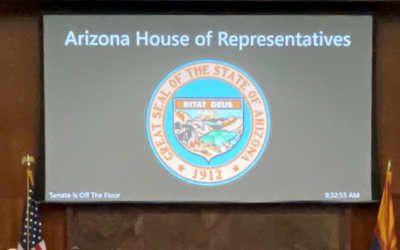By Terri Jo Neff |
Two voter initiatives will be on the 2022 General Election ballot even though some circulators of petitions in support of those initiatives may not have complied with state law, leading the Arizona Supreme Court to publicly call on Arizona Secretary of State Katie Hobbs to fix her system.
The justices ruled last week that their only option was to allow the Voters’ Right To Know Act and the Predatory Debt Collection Protection Act to be on the Nov. 2 ballot despite the fact some of the signatures used to qualify for the ballot were obtained by circulators who did not comply with the requirements of Arizona Revised Statute 19-118.
“The Court declines to find that the Committee or any individual circulator failed to comply with § 19-118 when the SOS has prevented such compliance,” Chief Justice Robert Brutinel wrote. Doing otherwise, he noted, would “unreasonably hinder” the initiative power granted to voters in the Arizona Constitution.
Circulators are required under ARS 19-118 to register with the Secretary of State’s Office for each initiative effort they are involved with. Part of the registration process includes a notarized Affidavit of Eligibility.
However, the justices would not allow any signature challenges on the grounds of noncompliance with the affidavit requirement. The decision, Brutinel wrote, is that Hobbs’ online “Circulator Portal” is not designed to permit submission of more than one affidavit per circulator.
And it gets worse, according to Brutinel.
“By also refusing to accept manual submission of a hard copy affidavit…the SOS rendered it impossible for circulators to successfully submit a registration application as required by § 19-118…if they had already registered to circulate other petitions,” the ruling states.
Therefore, “any circulators’ lack of compliance with § 19-118 does not invalidate the signatures gathered by these circulators on the record and circumstances before us,” Brutinel wrote, denying a challenge by several groups including Protect Our Arizona, Americans for Prosperity, the Arizona Free Enterprise Club, the Center for Arizona Policy Action, and the Goldwater Institute for Public Policy and Research.
Those groups argued in several election challenges that failure of a circulator to submit the affidavit is grounds for disqualifying all the petition signatures collected by that circulator for that initiative. The same position was argued by Gov. Doug Ducey, who filed an amicus brief in each case along with Arizona Senate President Karen Fann and Arizona House Speaker Rusty Bowers.
Another voter initiative considered by the Arizona Supreme Court last week ended with a different result but still pointed to the problem with being unable to hold circulators accountable for complying with state law.
The case involved the proposed Arizona Free and Fair Elections Act which needed 237,645 validated petition signatures to make the ballot in November. The Arizona Free Enterprise Club cited more than 30 objections including the circulator affidavit issue.
The affidavits did not matter in the end, as the Free and Fair Elections effort fell shy of qualifying for the ballot by roughly 1,500 signatures. Critics of the initiative point out the importance of ensuring the initiative process “strictly complies” with the requirements set out in state law.
To do otherwise, they argue, is to call into question the legitimacy of the process.








